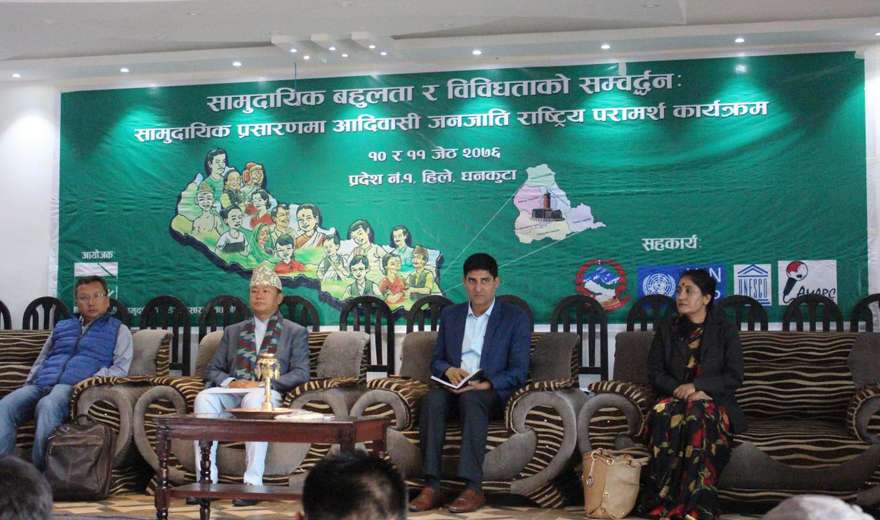BY DEV KUMAR SUNUWAR
At one time media in Nepal were criticized for ignoring the voices, participation and access of Indigenous Peoples. The Association of Community Radio Broadcasters (ACORAB)—an umbrella organization of community radio stations in Nepal, AMARC-Asia Pacific, UNESCO and UNDP Nepal recently jointly organized a national consultation on the state of Indigenous broadcasting to best address the concerns of Indigenous peoples in community radio.
Representatives from over 175 community radio stations from across country participated in a 2-day historic event, The National Consultation for Promoting Plurality and Diversity of Indigenous Peoples in Community Radio, organized in Dhankuta, in eastern Nepal on May 24 -25, 2019. The event was concluded by adopting a 6-point declaration and an action plan for promoting Indigenous Peoples increased access to community radio.
The declaration reads, “A code of conduct for Indigenous broadcasting will be prepared, at least 36 percent (proportionate to their population) programs in Indigenous languages and issues will be produced, meaningful participation of Indigenous Peoples will be ensured in the board and radio staffing, and more importantly a baseline survey will be conducted by adopting a strategic action plan to ensure inclusiveness and ownership of Indigenous Peoples in community radio.”
Limited access to information is a key challenge that Indigenous Peoples in Nepal face in making informed choices. The community radio stations that reach across local areas undoubtedly can promote voices and participation of Indigenous Peoples in public discourse at the local and national levels.
Limited access to information is a key challenge that Indigenous Peoples in Nepal face in making informed choices. The community radio stations that reach across local areas undoubtedly can promote voices and participation of Indigenous Peoples in public discourse at the local and national levels.
“Community radio stations across the world have an important role, not only for raising awareness, but also for promoting social diversity,” says Suman Basnet, regional director of AMARC-AP, adding, “the declaration and action plan adopted during the event, and the event itself is a way forward towards reflecting diversity and bringing positive change.”
Indigenous Peoples in Nepal have long been voicing their underrepresentation in media, including in community radio. As a result, Indigenous Peoples at radio stations are not always properly and positively portrayed. The media in Nepal has been criticized for not being accountable towards Indigenous Peoples, as radio stations had very little content on local issues and Indigenous interest and thus were strongly demanding newsroom diversity to bring in the voices and participation of Indigenous communities, as well as to ensure more Indigenous-sensitive coverage.
Radio stations especially FM, reach large parts of the country, and yet despite the presence of high numbers of community radio stations in Nepal, Indigenous Peoples’ issues are inadequately covered and often politicized. Local news and programming related to Indigenous Peoples is limited.
Language determines the relevance of information to Indigenous Peoples. The sad fact is that most of the content in FM radio in Nepal is available only in Nepali, which is not spoken by many Indigenous people. ACORAB however claims that community radio in Nepal does produce programs into over 70 different languages spoken in Nepal.
“Despite shortcomings, radio is still the preferred medium in Nepal in terms of reliability of information,” says Subash Khatiwada, chairperson of ACORAB. “The aim of this event is to ensure greater participaiton by bringing marginalized communities to be part of radio boards, by increasing their access to information, so stations become an inclusive voice and promote the participation of Indigenous Peoples.”
As of July 2017, government licensed as many as 740 FM radio stations and some 350 FM radio stations owned and operated by NGOs, which claim to be community oriented and are members of AMARC. Radio stations especially FM, reach large parts of the country, and yet despite the presence of high numbers of community radio stations in Nepal, Indigenous Peoples’ issues are inadequately covered and often politicized. Local news and programming related to Indigenous Peoples is limited. These challenges are starting to be addressed to better serve Indigenous Peoples with this event and with the honest implementation of the 6-point declaration and action plan.
This article orginally was published on June 13, 2019, on Cultural Survival's website, the link is here:
